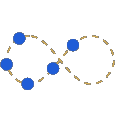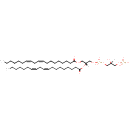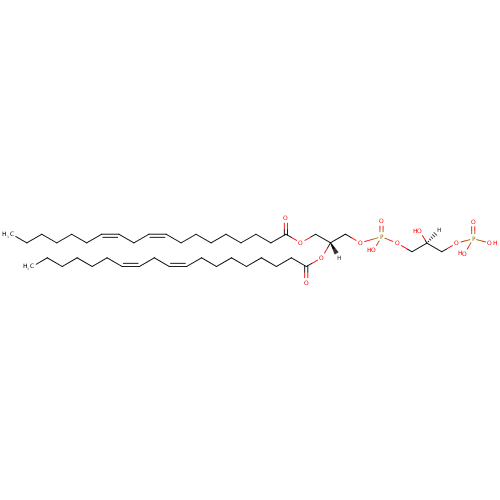|
Record Information |
|---|
| Version |
1.0 |
|---|
| Update Date |
1/22/2018 11:54:54 AM |
|---|
|
Metabolite ID | PAMDB006287 |
|---|
|
Identification |
|---|
| Name: |
PGP(18:2(9Z,12Z)/18:2(9Z,12Z)) |
|---|
| Description: | PGP(18:2(9Z,12Z)/18:2(9Z,12Z)) belongs to the class of glycerophosphoglycerophosphates, also called phosphatidylglycerophosphates (PGPs). These lipids contain a common glycerophosphate skeleton linked to at least one fatty acyl chain and a glycero-3-phosphate moiety. As is the case with diacylglycerols, phosphatidylglycerophosphates can have many different combinations of fatty acids of varying lengths and saturation attached to the C-1 and C-2 positions. PGP(18:2(9Z,12Z)/18:2(9Z,12Z)), in particular, consists of two 9Z,12Z-octadecadienoyl chains at positions C-1 and C-2. In Pseudomonas aeruginosa, PGPs can be found in the cytoplasmic membrane. The are synthesized by the addition of glycerol 3-phosphate to a CDP-diacylglycerol. In turn, PGPs are dephosphorylated to Phosphatidylglycerols (PGs) by the enzyme Phosphatidylglycerophosphatase. |
|---|
|
Structure |
|
|---|
| Synonyms: | Not Available |
|---|
|
Chemical Formula: |
C44H80O13P2 |
|---|
| Average Molecular Weight: |
879.059 |
|---|
| Monoisotopic Molecular
Weight: |
878.507416632 |
|---|
| InChI Key: |
LTCGYYIQFPFMIB-NHPPMFAOSA-N |
|---|
| InChI: | InChI=1S/C44H80O13P2/c1-3-5-7-9-11-13-15-17-19-21-23-25-27-29-31-33-35-43(46)53-39-42(40-56-59(51,52)55-38-41(45)37-54-58(48,49)50)57-44(47)36-34-32-30-28-26-24-22-20-18-16-14-12-10-8-6-4-2/h13-16,19-22,41-42,45H,3-12,17-18,23-40H2,1-2H3,(H,51,52)(H2,48,49,50)/b15-13-,16-14-,21-19-,22-20-/t41-,42+/m0/s1 |
|---|
| CAS
number: |
Not Available |
|---|
| IUPAC Name: | [(2S)-3-({[(2R)-2,3-bis[(9Z,12Z)-nonadeca-9,12-dienoyloxy]propoxy](hydroxy)phosphoryl}oxy)-2-hydroxypropoxy]phosphonic acid |
|---|
|
Traditional IUPAC Name: |
(2S)-3-{[(2R)-2,3-bis[(9Z,12Z)-nonadeca-9,12-dienoyloxy]propoxy(hydroxy)phosphoryl]oxy}-2-hydroxypropoxyphosphonic acid |
|---|
| SMILES: | [H][C@](O)(COP(O)(O)=O)COP(O)(=O)OC[C@@]([H])(COC(=O)CCCCCCC\C=C/C\C=C/CCCCCC)OC(=O)CCCCCCC\C=C/C\C=C/CCCCCC |
|---|
|
Chemical Taxonomy |
|---|
|
Taxonomy Description | This compound belongs to the class of organic compounds known as phosphatidylglycerophosphates. These are glycerophosphoglycerophosphates in which two fatty acids are bonded to the 1-glycerol moiety through ester linkages. |
|---|
|
Kingdom |
Organic compounds |
|---|
| Super Class | Lipids and lipid-like molecules |
|---|
|
Class |
Glycerophospholipids |
|---|
| Sub Class | Glycerophosphoglycerophosphates |
|---|
|
Direct Parent |
Phosphatidylglycerophosphates |
|---|
| Alternative Parents |
|
|---|
| Substituents |
- Diacylglycerophosphoglycerophosphate
- Sn-glycerol-3-phosphate
- Fatty acid ester
- Monoalkyl phosphate
- Dialkyl phosphate
- Dicarboxylic acid or derivatives
- Organic phosphoric acid derivative
- Phosphoric acid ester
- Alkyl phosphate
- Fatty acyl
- Secondary alcohol
- Carboxylic acid ester
- Carboxylic acid derivative
- Organooxygen compound
- Organic oxide
- Organic oxygen compound
- Alcohol
- Carbonyl group
- Hydrocarbon derivative
- Aliphatic acyclic compound
|
|---|
| Molecular Framework |
Aliphatic acyclic compounds |
|---|
| External Descriptors |
Not Available |
|---|
|
Physical Properties |
|---|
| State: |
Not Available |
|---|
| Charge: | -3 |
|---|
|
Melting point: |
Not Available |
|---|
| Experimental Properties: |
|
|---|
| Predicted Properties |
|
|---|
|
Biological Properties |
|---|
| Cellular Locations: |
Membrane |
|---|
| Reactions: | CDP-DG(18:1(11Z)/22:6(4Z,7Z,10Z,13Z,16Z,19Z)) + Glycerol 3-phosphate + CDP-DG(18:1(11Z)/22:6(4Z,7Z,10Z,13Z,16Z,19Z)) > PGP(18:2(9Z,12Z)/18:2(9Z,12Z)) + Hydrogen ion + Cytidine monophosphate + Cytidine monophosphatePGP(18:2(9Z,12Z)/18:2(9Z,12Z)) + Water > Phosphate + PG(18:2(9Z,12Z)/18:2(9Z,12Z)) |
|---|
|
Pathways: |
Not Available |
|---|
|
Spectra |
|---|
| Spectra: |
|
|---|
|
References |
|---|
| References: |
- Yurtsever D. (2007). Fatty acid methyl ester profiling of Enterococcus and Esherichia coli for microbial source tracking. M.sc. Thesis. Villanova University: U.S.A
|
|---|
| Synthesis Reference: |
Not Available |
|---|
| Material Safety Data Sheet (MSDS) |
Not Available |
|---|
|
Links |
|---|
| External Links: |
| Resource | Link |
|---|
| CHEBI ID | Not Available | | HMDB ID | Not Available | | Pubchem Compound ID | Not Available | | Kegg ID | Not Available | | ChemSpider ID | Not Available | | Wikipedia ID | Not Available | | BioCyc ID | Not Available |
|
|---|


